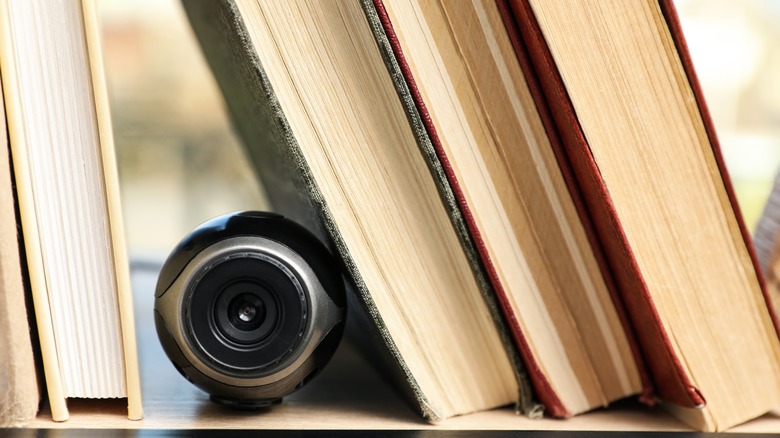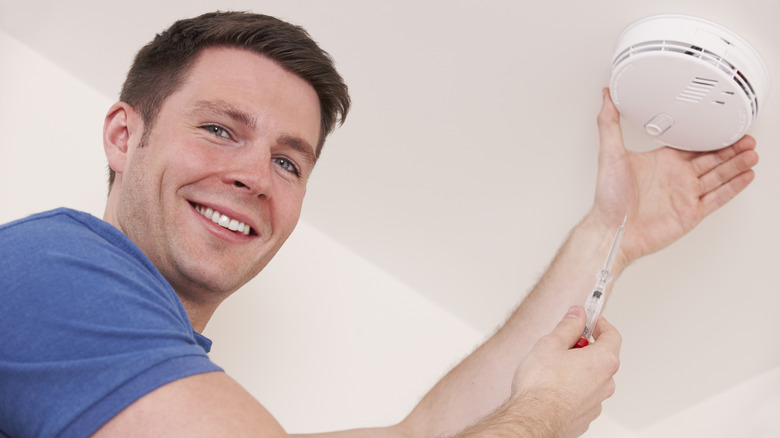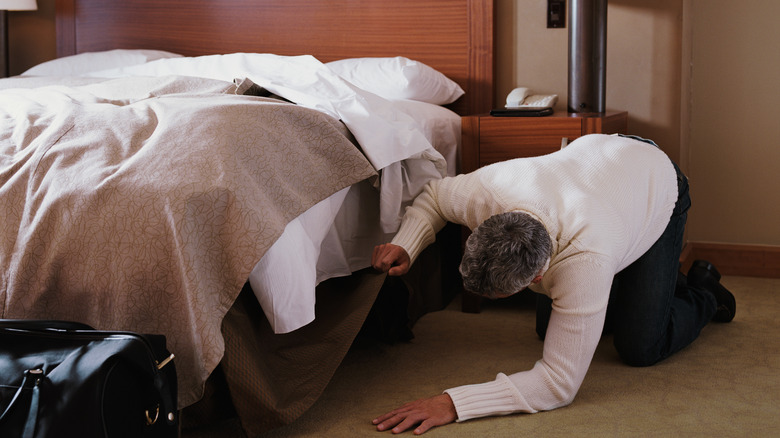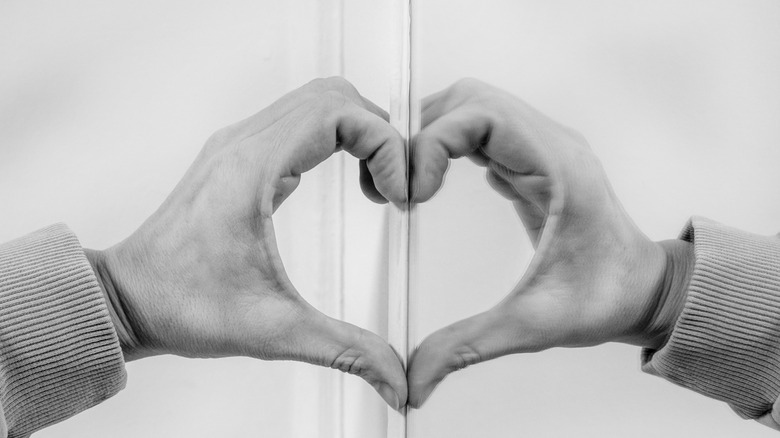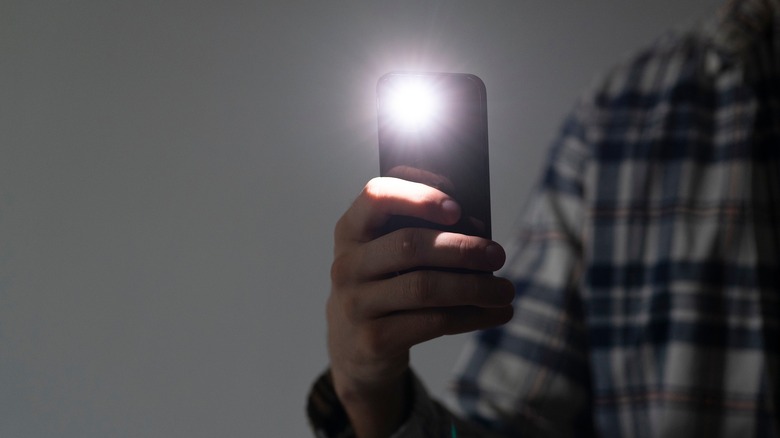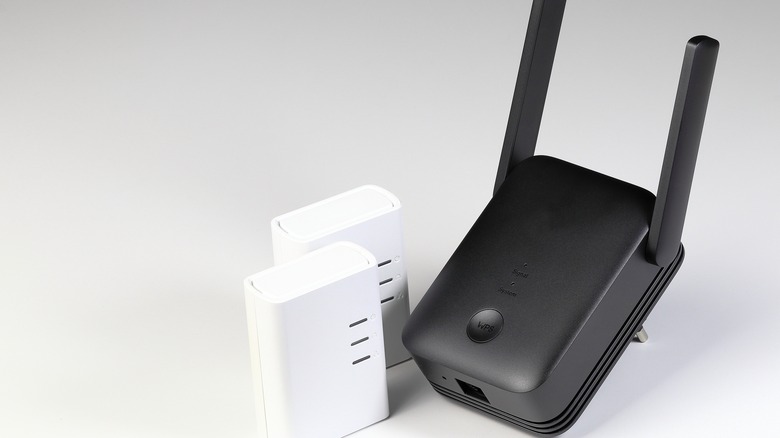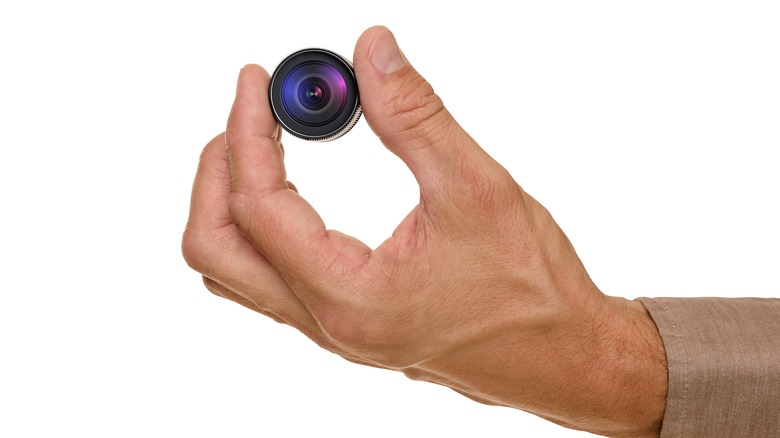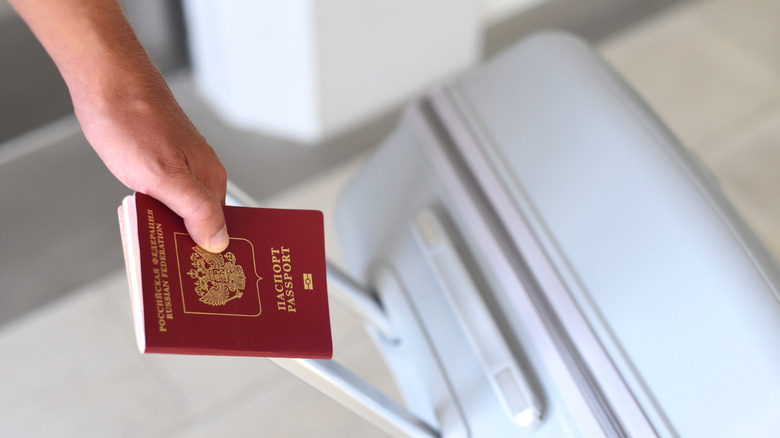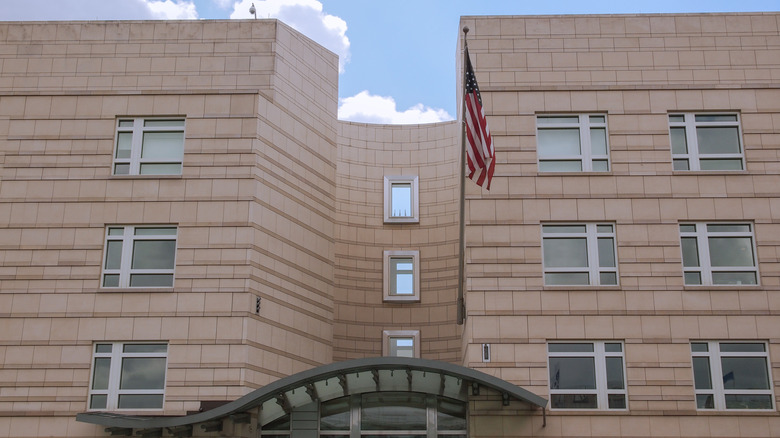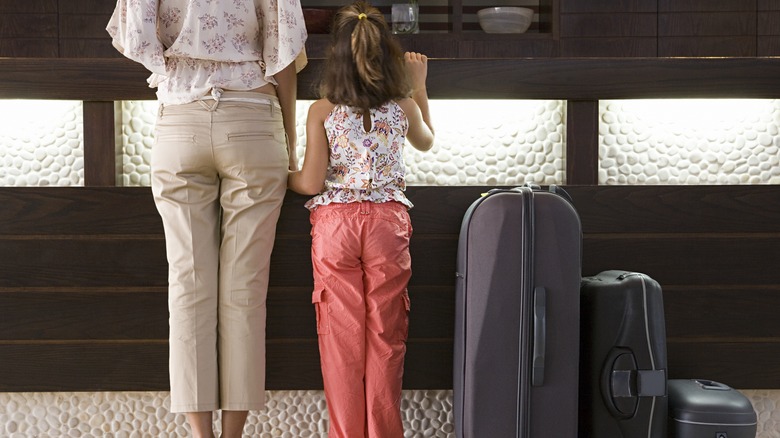How To Protect Against Hidden Cameras When Traveling (And What To Do If You Find Them)
Though it isn't common, finding a camera in your travel accommodations is unnerving, to say the least. When it comes to Airbnb or other private vacation rentals, for example, 11% of surveyed travelers said they have found hidden cameras in their lodgings. Airbnb does not allow hosts to record their guests without their consent. Airbnb hosts are allowed to have video surveillance in common areas, but they have to tell their guests that recordings are in progress whereas Vrbo doesn't allow any recording at all.
While laws are different around the world, in the United States it's illegal for accommodations to record their guests without their knowledge. That isn't just true for video recordings either, audio records are equally as illegal. So when looking for hidden recording devices, keep that in mind.
Although experts say it's far less likely to happen in a professional hotel environment, hidden cameras can still happen. Luckily you can do a few things to protect yourself while traveling and there are some tricks to learn to help locate hidden cameras when you first check in.
Know the common hidden camera decoys
Obviously, hidden cameras are trying to be inconspicuous. Unfortunately for travelers, that means that they can be obscured in even the most commonplace locations. Lightbulbs, door peepholes, smoke detectors, and even screws can contain tiny cameras. If you notice an odd arrangement of furniture, especially in an Airbnb or private vacation rental, consider that a red flag to investigate that area. Hidden cameras in places like outlets, for example, are often surrounded by objects trying to distract you from looking.
Another way to avoid potential hidden cameras is to simply unplug any electronic devices in the hotel or lodging room you won't be using. Generally, hidden cameras need some kind of electronic connection, so if they're hidden in something like a wall outlet extender, TV, or anything else, you'll nip it in the bud by just unplugging them.
If you come across a weird-looking device, try looking it up online. There should be a model or unit number somewhere on the device and a quick internet search should bring up if it's a legitimate object or a fake.
Look around everywhere for potential hidden cameras
Hidden cameras can truly be anywhere in an accommodation. Just because you don't find anything around the sleeping area doesn't mean they aren't hiding out in the doorway, the closet, or even the bathroom. You could even find hidden cameras tucked in toilet seats. Disgusting, yes, but even more reason to be thorough in your search.
The first two places you'll want to thoroughly search are the bathroom and bedroom areas of your accommodation. These are the two most common places where hidden cameras will be placed. Even something as innocuous as a painting or canvas on a wall can be a hidden camera decoy, so don't feel weird investigating everything.
If you see things hung too close together on a wall, that should be a red flag for you. Immediately check that out because it's a common giveaway that something isn't right about one of those hanging objects. That's particularly true if you see multiple smoke alarm-looking devices or out-of-fashion/out-of-date clock radios.
Use the fingernail trick on mirrors
Whether the images in any of the mirrors are slightly distorted or not, you can always try putting your fingernail up against the mirror. It isn't a perfect system, but the general rule of thumb is that if your fingernail has a gap between it and its reflection, the mirror is real. If the nail looks like it is touching its reflected twin, the mirror could actually be a fake. It could be concealing a camera or even a whole window acting as a two-way mirror.
You can also check out the physicality of the mirror. Try to look behind it by pulling it away from the wall. If you can easily move it away from the wall or take it down, it's a regular mirror. If it is firmly attached to the wall almost like it's part of the wall itself, there is more reason to be suspicious. Two-way mirrors are not able to be moved away from the wall.
One more way you can investigate a mirror is by pressing your face against it. Cup your hands around your face to create more darkness around your eyes. By putting your eyes closer to the mirror, if it is two-way glass, you may be able to see some of the open area or the camera behind it.
Turn off the lights to find hidden cameras
Turning the lights out in the room, closing all the blinds, and making the room as dark as possible can help you find hidden cameras. Use your phone's flashlight to look for any reflections coming back from the dark room. If the flashlight comes in contact with a hidden lens, it will create a small shine.
For this method to be successful you need to move your flashlight around so it comes from different parts of the room. The lens of a hidden camera will only reflect the light from certain angles, so just because a quick light flash around the room doesn't reveal anything doesn't mean it wouldn't if you checked again from the other side of the room.
Make sure you aim the light at electronic devices first as they're the most likely to contain hidden cameras. The same goes for any fixtures or art hanging on the walls. Cameras can easily blend into busy artwork or light fixtures you might not think to check.
Check the Wi-Fi
If you somehow have access to the Wi-Fi network and can check what devices are attached to it, that's the easiest way to detect a hidden camera device. But that isn't very common for vacation rentals.
However, since you're unlikely to have access to the wifi like an administrator, you can still check for other devices using a Wi-Fi scanner. A scanner like Fing will search the Wi-Fi network for connected devices. It's possible to find cameras using this method because they will have their device name or brand as their Wi-Fi connection name.
Looking at the list of found, connected devices might not give you an obvious hidden camera. In this case, take a look at what is connected to the Wi-Fi and try to find all of those items around the accommodation. It's possible the camera device was renamed to be more inconspicuous. If you can't find all of the devices, write down the IP address of that item so you can use the app to search its open ports (specifically RTSP and RTMP services) to see if it is streaming. A hidden camera will reveal streaming if you search the port's browser with its IP address.
Use a hidden camera-detecting app
While not perfect, several apps across iPhone and Android devices can detect hidden cameras. Using a variety of search functions, these apps make it possible to quickly scan the room for radio waves or infrared signals. While you might find other devices like a smart speaker or other Wi-Fi-connected items, you can also find little hidden gadgets as well.
This way of hunting down hidden cameras is much easier for less tech-savvy folks than the network searching method we mentioned already. Instead, the app will do all of the work for you by alerting you with a sound if it finds something. Apps like the Spy Hidden Camera Detector for iPhone or the Hidden Camera Detector Free for Androids will scan the room for reflections of infrared and give off an alarm sound if they discover one.
Hidden Spy Camera Detector or Glint Finder for iPhone and Hidden Camera Detector Pro for Android will use your phone's magnetic sensor to detect hidden cameras in proximity. These apps aren't perfect, however, they can get the search done much faster than a person looking around on their own.
Be extra aware on international travel
When it comes to traveling domestically, cameras are still a danger, though they are less likely than in other countries, especially when staying in hotels with good reputations. It's far more likely to encounter hidden cameras in more reputable hotels when abroad, especially targeting business people. If you're visiting somewhere like China or Russia, you want to be doubly aware of your surroundings, especially when using your computer as cameras are often pointed in the direction of where you'd be working in hopes of stealing information from your screen.
All of the above tricks will work when traveling internationally but since laws differ so widely all over the world you need to be more aware of your surroundings. In 2019 a criminal ring was discovered in South Korea using pinhole-sized hidden cameras to secretly record over 1600 hotel guests. Not only were they recorded but those recordings were also live-streamed online. Those cameras were discovered all over the country in things like TV boxes, wall sockets, and even hairdryer holders. Do your research into the company you'll be visiting so you can be aware of any hidden camera-related news that's happened there recently.
Where in the world to expect to find cameras
As mentioned above, it's more likely to encounter hidden cameras in hotels in countries like China and Russia. While you may be tempted to do a hidden camera deep dive in your hotel room in countries like these, you may want to think twice.
Government surveillance of foreigners traveling in highly surveilled countries like Russia and China is common. So interfering with cameras or devices potentially hidden by the government could get you in a lot of trouble. Even the simple act of looking for hidden cameras or audio recording devices could get you labeled as a "hostile intelligence operative."
If traveling to countries that could prosecute you for finding hidden cameras, there are a few simple things you can do to protect yourself. You can turn items like radios or clocks around so they face a wall and toss a towel over the television. These simple acts could save you from being illegally recorded and potentially arrested for investigating too hard.
If you find a hidden camera, report it
If you do uncover a hidden camera, depending on what kind of accommodation you're staying in, you need to report it. If it's a hotel situation, immediately tell the front desk. But if you're staying in an Airbnb or private vacation rental situation, contact the company directly. Do not reach out to your hosts. Your safety is paramount in that situation and the company can intervene on your behalf.
Hotels will frequently offer you a different room. If, for some reason, you aren't offered one and have to stay in that location for at least a night, do whatever you can to protect yourself. Turn objects around, unplug electronic devices, and be more aware of yourself in the space. It's unlikely you'd be stuck in this kind of situation, but if you are and cannot find different lodging, you can still try to make the most of it while keeping yourself safe.
Contact the local authorities
Especially if you're staying at a privately owned location or you feel unsafe, contact the local authorities immediately. Don't touch the hidden camera if you can avoid it as it will be a piece of evidence. If you find a hidden camera in the United States, you can call the local non-emergency number. If you are out of the country, you can tell the local authorities but also contact the closest U.S. embassy too.
Whenever possible, try to ask for a copy of the police report. You might need it for your insurance if something happens or goes missing and you can have it in case you need it later for prosecution. Civil lawsuits are possible if you stay somewhere and find that you are being illegally recorded in a hotel room or private vacation rental.
Telling the authorities is one way to stop the situation from happening to someone else. It is also a means of creating a paper trail. Even if you don't think of pressing charges in the moment, you may decide to do so later and will need the reports.
Find a new place to stay
Even if the front desk at the hotel offers you a different room because you found a camera, you're probably better off finding someplace else to stay. Just assume that every room has some kind of hidden device, even if it's a well-known hotel chain, and stay elsewhere. Your peace of mind will thank you. Not to mention that the situation could get more dangerous if you decide to stay.
As mentioned above, even if you move to a new location, still contact the local authorities. Doing so will help protect other travelers in the future as well as give you the evidence you need to press charges if you decide to later on.
A company like Airbnb, which has specific rules against hidden cameras, should be able to help you not only get a refund but also help you find new accommodations. Their team is incredibly helpful when things go awry. Absolutely reach out to them for help if you need a new place to stay.
